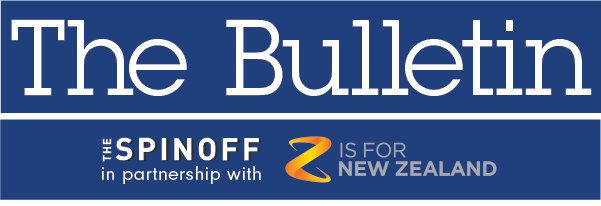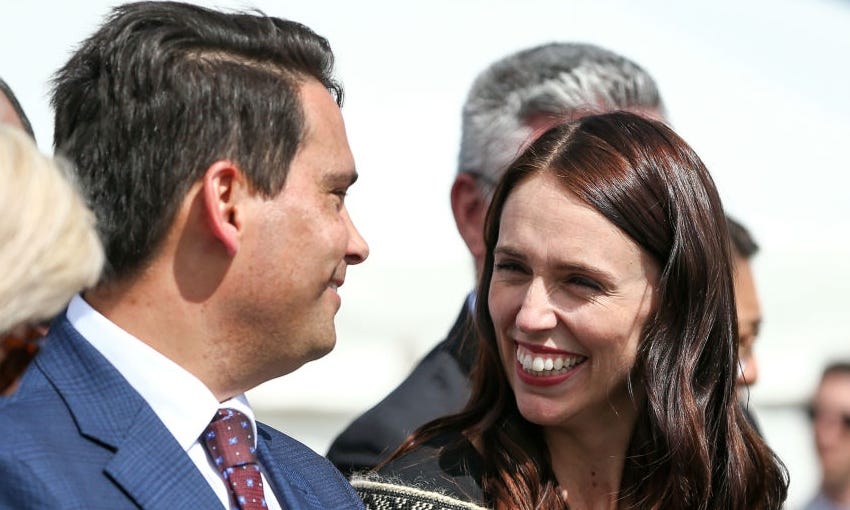New poll sets scene for election year
Just a few points either way would dramatically change the shape of parliament

Good morning and welcome to The Bulletin for Monday 10 February, by Alex Braae for The Spinoff. Presented in partnership with Z Energy.
In today’s edition: New poll sets scene for election year, scale of public support for Weta Group revealed, and Phil Goff’s emails for sale.

Image: A moment of levity between Simon Bridges and Jacinda Ardern at Rātana (Getty Images)
Each poll is just one snapshot, but this particular one is very interesting. The Newshub Reid Research poll has Labour and the Greens with a collective two-seat majority, with National and ACT very close to forming a government. But there are some potential outcomes that could upset that balance. For example NZ First (on 3.6%) might get up. And the Māori Party (on 0.9% party vote) would have the potential to claim back some Māori electorates, but on that point it's worth reading commentator Morgan Godfery's analysis of their chances – Labour are still going in quite strong there.
For the minor parties otherwise, it's looking really tough. Both the Opportunities Party and New Conservative dropped to below 1% – in New Conservative's case, some might be going to ACT. That 5% threshold, which is probably the only way either will get in, is not getting any closer. We're also yet to see the emergence of Sustainable NZ, Vision NZ, the Outdoors Party, Social Credit and others.
As for the preferred PM stakes, Simon Bridges is slowly clawing his way up, but there's a long way still to go. Newshub reports he's on just over 10%, so still way behind Jacinda Ardern on 38.7%. Opposition leaders always tend to do relatively poorly in this question, but it's still probably a bit of a worry for National that only about a quarter of their voters firmly want the leader to be PM.
And finally, another really interesting question was asked of those voters by Newshub: They asked National supporters if they wanted the party to work with NZ First, and vice versa. And the results showed slightly more National voters wanting cooperation over opposition, and a clear majority of NZ First voters feeling the same way. These numbers might be slightly out of date, given the survey was conducted before Simon Bridges ruled NZ First out. But it also shows that maybe, if the numbers end up falling that way after the election, some voters would be happy enough with that pledge being broken so long as it provided the government they wanted.
A remarkable case of government industry support being concentrated down to a small number of recipients has been revealed. The NZ Herald's (paywalled) Matt Nippert reports Weta Group – the collection of companies that make up Sir Peter Jackson's filmmaking empire – received about $40 million a year in public funding between 2015 and 2018, almost half of the total Screen Production Grant scheme. That is paid out in rebates, so it's directly related to jobs being created, and brings flow-on economic benefits from tourism and more amorphous national branding.But the really interesting part is how long and hard Weta fought to prevent publication of the figures, with the Ombudsman having to investigate it for 18 months.
A strange story broke over the weekend about hackers trying to sell tens of thousands of Auckland mayor Phil Goff's emails. The NZ Herald's David Fisher reports that the database spans from 2007 to 2019, and were both sent and received from Goff's personal account. Now I want to be very clear that we don't know if this is what has happened, but if he's been conducting mayoral, Council or parliamentary business on a personal email address, he could be in some trouble. As Goff himself put it in 2011 when former minister Murray McCully was hacked, "anything (of) an official nature should be going through protected channels."
Labour MP for Mana Kris Faafoi has decided to go list-only at the next election. He says he's hopeful of playing a role in the next government, and that it gives the party a chance to bring a new MP in parliament in a reasonably safe seat. Writing on The Spinoff, I've analysed what the decision could mean for Faafoi's burgeoning role in government. The piece also goes into who might get the Labour nomination, with two local Porirua councillors indicating that they're at the very least thinking about having a crack.
Forest and Bird have claimed that landowners in the West Coast have wiped out vast areas of wetlands over the last two decades. Radio NZ's Lois Williams reports that the claim – based on aerial images supplied by Landcare – would make the West Coast the worst region in the country for this sort of ecosystem destruction. The Regional Council says they're "confident in our planning framework to protect those areas which are significant, either in vegetation or as habitat of indigenous fauna." They also cast doubt on the use of aerial photography to make such a claim. Speaking of wetlands, this morning's piece by Newsroom's Farah Hancock is a good explanation of why they matter so much as habitats.
There are questions being raised over whether rental insulation standards are too easy to dodge, reports One News. The law changed seven months ago, and advocates say tenants themselves are the ones who effectively have to enforce it. There is also no record of exactly how many landlords are or aren't complying with the new law, but the Capital Property Investors Association say the vast majority of landlords are following the rules.
A fascinating piece of public accountability journalism out of Queenstown: Crux has been banging away for years to try and get details of Queenstown District Council spending on consultants and contractors, and finally got provided three years worth of data (in perhaps the least convenient and readable format.) What has come back is a combination of the standard sorts of spending you'd expect, and a few rather more curious details that could certainly stand a bit more scrutiny. In short, it's a very good time to be a consultant in the Lakes District. One new consulting company in particular has been the focus of this very interesting follow up story.
Got some feedback about The Bulletin, or anything in the news?
Drop us a line at thebulletin@thespinoff.co.nz

Right now on The Spinoff: Alex Casey goes on a wild goose chase to find a limited edition $10 note with a much higher value. Jose Barbosa learns to love the movies again in the collective humanity of a special screening of Cats. Duncan Greive has some principles for investing in the global market that you should read before you start throwing money around. Duncan Greive has also written about the public broadcasting reforms, and how they present another huge threat for private media companies, who are already up against it. Ben Thomas discusses why the arts are hard for politicians to care about, despite the noise generated around them. Josie Adams goes to the wall to defend Crocs, the hideously ugly footwear that is making a comeback. Emily Writes looks on the bright side of Wellington's rubbish summer weather.
And here's the absolute must-read piece of the weekend, and possibly the year so far for our site: We often hear about how the health system is broken, but what does that actually mean? Writer and doctor Glenn Colquhoun, who works in a Horowhenua hospital, has outlined in stark and revealing detail how fundamental the problems are, and how it won't much matter if new programmes are put in place over the top of the existing, crumbling structure.
For a feature today, an interesting comparison piece on an economic success story for the country. Gaming news website Kotaku reports that NZ's gaming industry is now larger than that of Australia. That's partly because of government support, so it's an interesting additional story to keep in mind regarding the Matt Nippert piece on government support for the film industry shared earlier in today's edition. Here's an excerpt:
The largest studios in New Zealand generated 93 per cent of the reported revenue, according to NZGDA, and employ around 77 per cent of the country's games workforce.
NinjaKiwi's Bloons TD6 and Grinding Gear Games' Path of Exile were both called out in the report as key drivers of New Zealand's games industry growth, as well as Little Lost Fox's Valleys Between.
Given that Path of Exile is one of the "top ten played PC games in the world", it's likely that the MMORPG made a significant dent in the growth of New Zealand's local games industry. This year, they held their first ever local convention for the game, ExileCon, which Kotaku Australia attended as a guest of Grinding Gear Games.
The signs are looking good for the Wellington Phoenix to survive in the A-League long term, reports the Sydney Morning Herald. Their license expires at the end of this season, but the report indicates that the axe that has been hovering for the last several seasons is in the process of being lifted – despite the club not quite managing to meet various metrics around attendance and memberships. On the field, their strong run has stalled a bit, with two losses in the last three games, and plenty of chances left for other teams to bundle them out of the playoffs.
And in the cricket, the news has got altogether much better. The White Ferns are up 2-1 in their T20 series against South Africa, with a chance to close it out today. And the Black Caps, lo and behold, have snapped a long losing streak to hold an unassailable lead in their ODI series against India. What's strangest about this is that it has come after coach Gary Stead took an allegedly pre-planned break, sparking all sorts of wild conspiracy theories about what was going on inside the team camp. I've written about why sports is the perfect breeding ground for conspiracist thinking by fans, and how maybe in this case it would be fine if we were being lied to by administrators.
That's it for The Bulletin. If you want to support the work we do at The Spinoff, please check out our membership programme.




